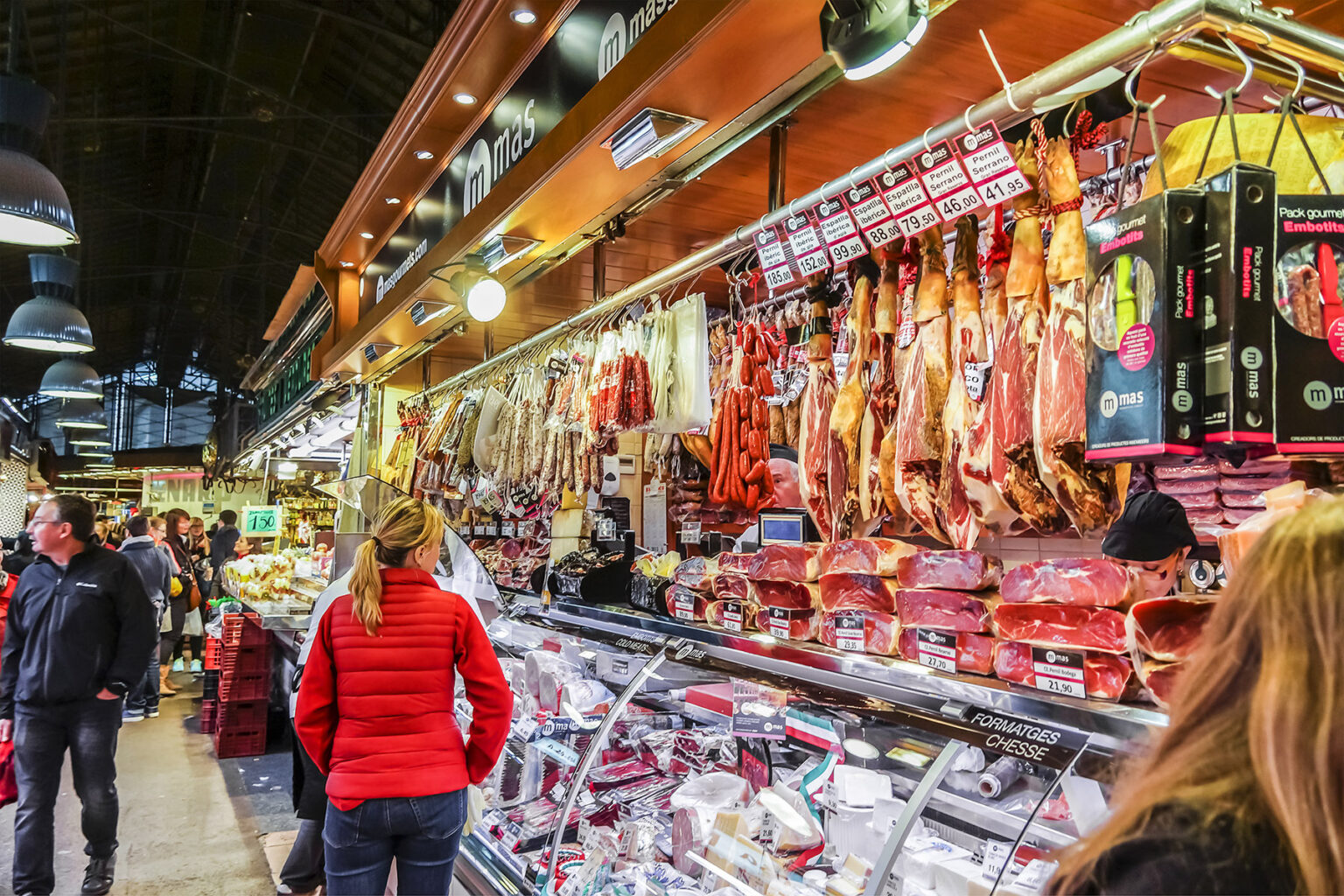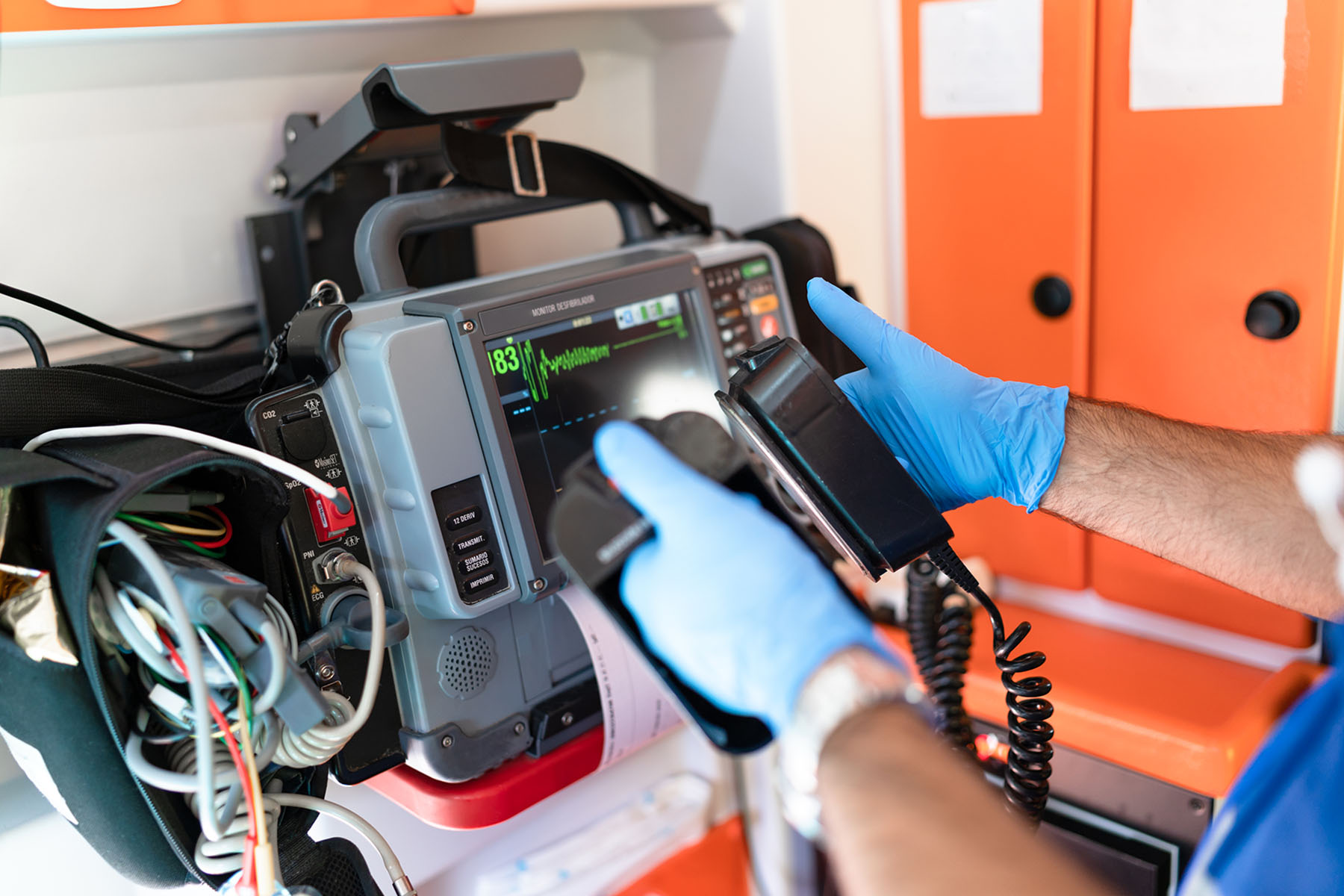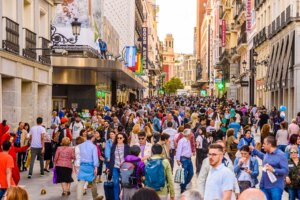One of the best things about moving abroad is exploring your new home country with your tastebuds. However, upon arriving in Spain, you’ll soon realize that the local food and drink culture is more than something to simply explore in your spare time. On the contrary, it quickly becomes an integral part of how you live your life under the dazzling Spanish sun.
As well as heading to the country’s many cafes and terraces, one of the best ways to explore Spanish food is in the aisles of your local supermarket. However, if you’re a new arrival, it can be tricky to know which supermarkets you should be visiting and how the local process works.
So, to ensure that you don’t go hungry, this article on supermarkets and grocery stores in Spain includes the following information:
- Grocery shopping in Spain
- Supermarkets in Spain
- Things you need to know about Spanish supermarkets
- Food delivery services in Spain
- International grocery stores in Spain
- Food shopping at Spanish markets
- Specialty stores in Spain
- Health food shopping in Spain
- Convenience stores in Spain
- Liquor stores in Spain
- Buying groceries from your home country in Spain
N26
N26 is the bank you'll love to use: open your bank account in just eight minutes with no paperwork. Take control of your finances with one app where you can manage limits, set your PIN, lock/unlock cards, and make no-fee transactions anywhere in the world.
Grocery shopping in Spain
It doesn’t matter whether you’re arriving in Sevilla, Salamanca, or Santander, the local supermarket is probably one of the first places you will visit in Spain. But before you start piling up your shopping cart, you should be aware that grocery shopping in Spain is likely to be a little different from what you’re used to. But don’t let that put you off, because once you’ve worked out how it all works, you’ll soon find plenty to tempt your tastebuds when browsing the grocery store shelves.
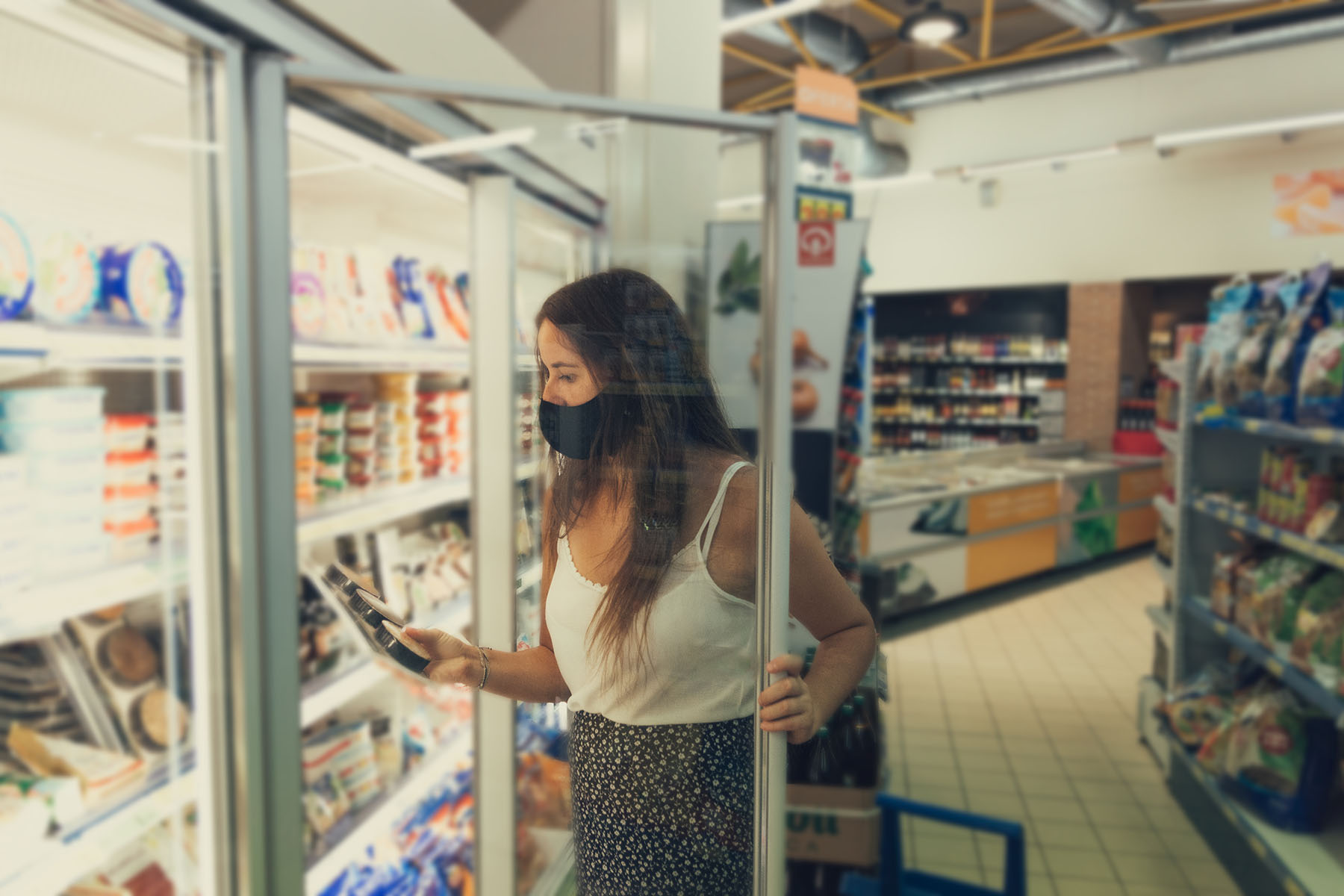
Alternatively, if supermarkets aren’t your thing, there are plenty of other options in Spain. For instance, many towns and cities have markets where you can buy fresh goods, such as fruit, vegetables, and meat from local producers. If all that sounds too much like hard work, though, you can also sign up for a meal-kit delivery service and have fresh ingredients and recipes delivered straight to your door. And if you don’t feel like cooking at all, you’ll find plenty of great restaurants, tapas bars, and cafés in Spain.
Supermarkets in Spain
Spanish supermarkets come in all sorts of shapes and sizes. Arrivals from North America will recognize the bulky, US-style out-of-town hypermarkets in many larger Spanish towns and cities. In city centers, meanwhile, smaller grocery stores are much more common. These are typically scaled-down versions of these larger stores, however, many remain independently run. Wherever you’re shopping, though, Spanish supermarkets stock a wide range of goods from Spain and beyond.
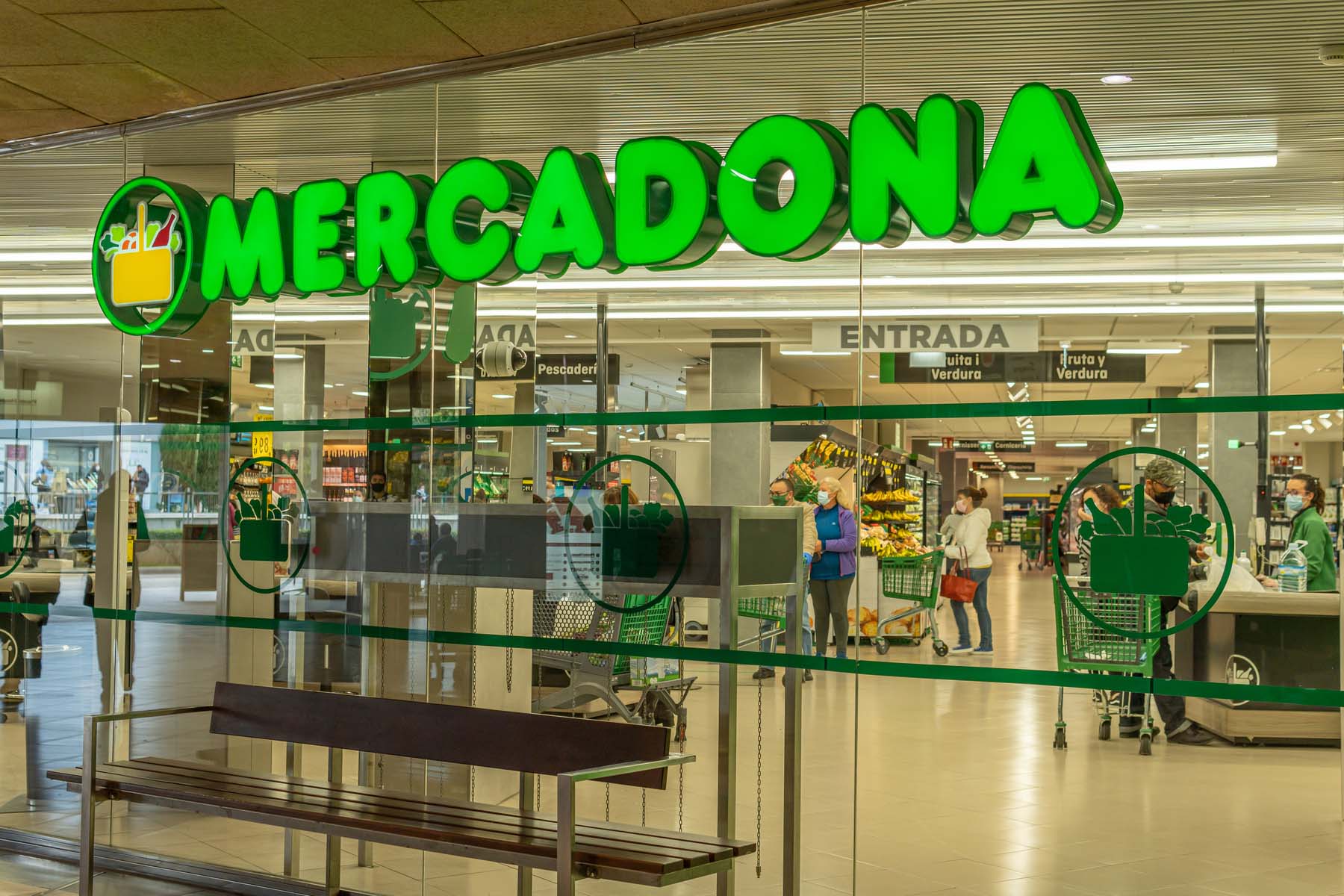
If you’re living in the center of a big city like Barcelona, Madrid, or Valencia, you’ll typically find many smaller supermarkets in more central areas. These sell everything you need in terms of food and drink, but not a great deal else. Further out from the city centers, you’ll find larger supermarkets that stock more variety and a wider range of non-food items. At the edge of towns, there are often hypermarket-style stores that are easily accessed by car and, sometimes, public transport connections. These can sell everything from bread and fruit to home electronics and clothes.
Generally speaking, Spanish supermarkets are pretty affordable. Of course, this will largely depend on which chain you end up shopping at, as some can be significantly more expensive than others. Unlike in North America, many Europeans will typically shop at a few supermarkets, letting them take advantage of the differences in stock and prices. That said, Spanish supermarkets are well-stocked so you won’t ever feel like you’ve run out of ideas for dinner.
Spanish supermarket chains
In short, there are a lot of supermarket chains operating in Spain. While many of them are nationwide, there is also a strong tradition of regional supermarkets throughout the country. Therefore, don’t be surprised to see a supermarket you’ve never heard of when traveling around. Some of the major Spanish supermarket chains include:
- Mercadona: The largest Spanish supermarket chain has over 1,500 stores across Spain (and neighboring Portugal). Products are reasonably priced but the range can differ depending on the size and location of the store.
- Carrefour: The French retailing giant has the second-highest market share in Spain, with over 1,000 stores. These range from hypermarket-style outlets to smaller neighborhood shops.
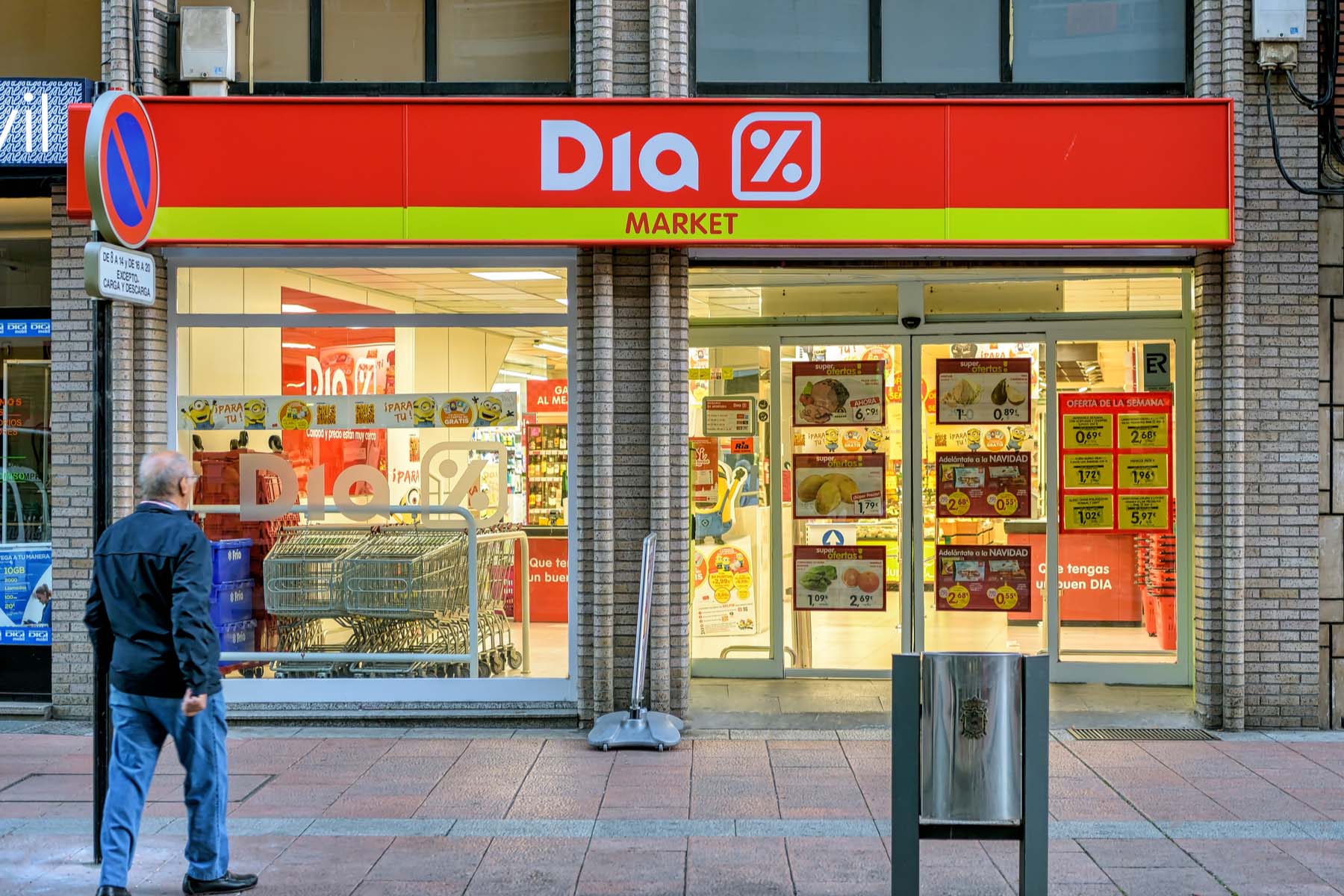
- Alcampo: Part of the French-owned Auchan group, Alcampo is a chain of hypermarkets that stock everything from Jamon Iberico to hand-held electronics. Stores can generally be found in out-of-town locations.
- Eroski: Originating in the Basque Country, co-operative Eroski has around 1,000 outlets throughout Spain, ranging from hypermarkets to convenience-style stores.
While you’ll typically find these chains in towns and cities throughout Spain, regional grocers tend to stock a greater number of local products alongside their regular range. Regional supermarkets in Spain include Gadis (Galicia and Castilla y León), Caprabo (Catalunya), and MAS (Andalucia), but there are many more so keep your eyes peeled.
Discount supermarket chains in Spain
As in most European countries, you’ll find a number of discount supermarkets in Spain. These typically offer a no-frills shopping experience, with cheaper products and less choice. The leading discount supermarkets in Spain include:
- Lidl: The German discounter is the third-largest supermarket chain in Spain, with over 600 stores across the country. These offer a narrow product range and regular non-food sales and discounts.
- Dia: The largest Spanish discounter stocks a good range of own-label and national brands. Store sizes vary but they typically offer more choice of products than their German competitors.
- Aldi: Another German discount supermarket, Aldi has hundreds of stores across the country, selling a decent range of goods at affordable prices.
Spanish specialty and organic supermarkets
Spanish supermarkets are becoming increasingly accomodating to consumers who have special dietary needs, such as gluten-free or vegan options. However, if you’re looking for something that normal supermarkets don’t stock; such as the latest superfood, the best local organic produce, or something a little more indulgent, you have several options in Spain, including:
- El Corte Inglés: The upmarket Spanish department store also has a supermarket chain, which is typically in the basement of its larger stores. However, Hipercor and Supercor are also standalone supermarkets from El Corte Inglés.
- Veritas: This chain of organic supermarkets is predominantly found in Catalunya, Madrid, and the Basque Country. You can expect to pay a little more, but the quality is good and, of course, organic.
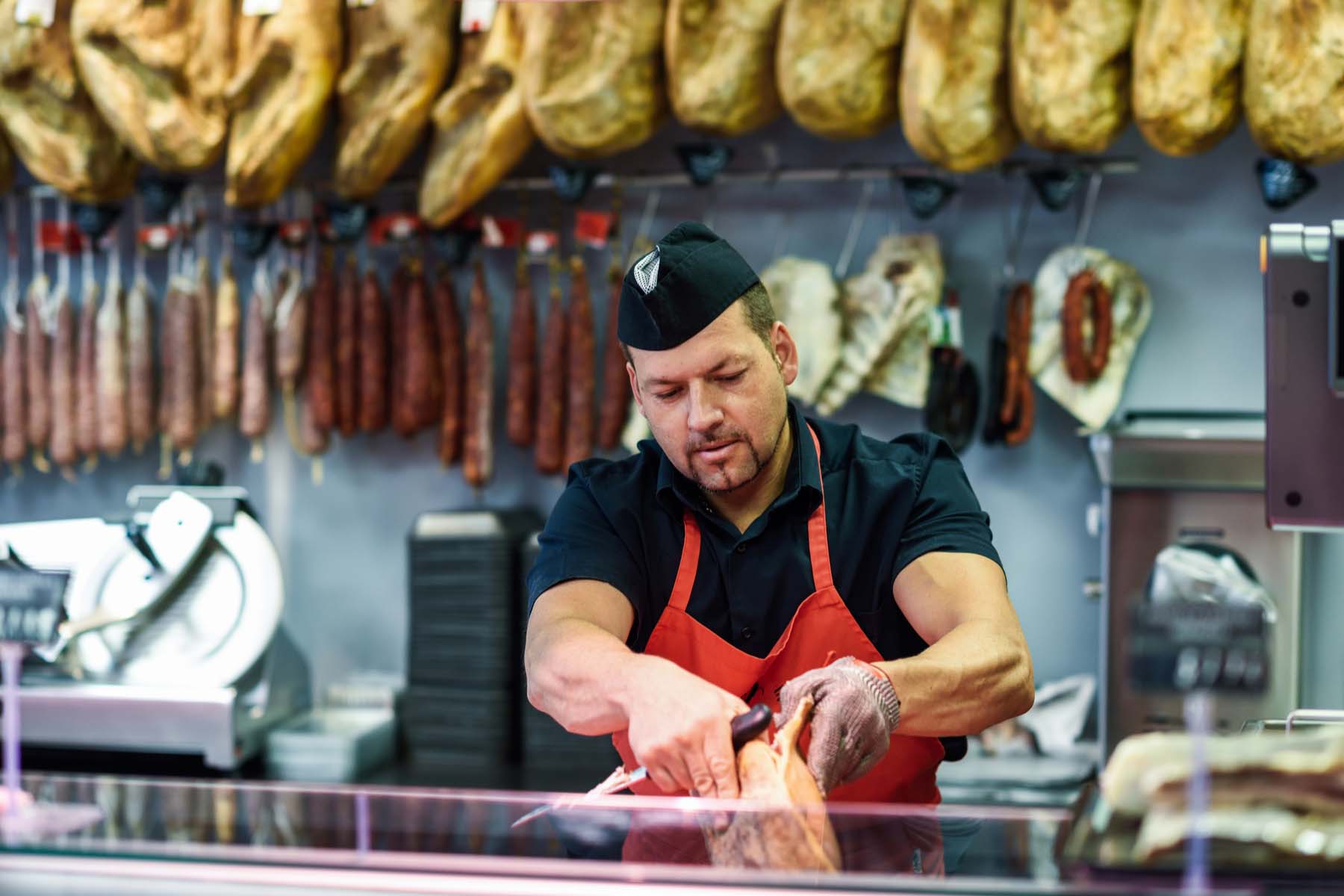
Supermarket opening times in Spain
Generally speaking, the Spanish definitely follow their own rules when it comes to opening hours. However, while many clothing and other shops throughout the country close in the middle of the day to respect the local siesta, supermarkets typically do not. Most open around 08:00 or 09:00 in the morning and close between 21:00 and 23:00, depending on their location. In rural areas, however, opening hours are typically more limited and some will close for siesta, so you should plan accordingly ahead of time.
Spanish supermarkets are typically closed on Sundays. However, if you’re in need of some last-minute groceries, you’ll be able to find some smaller stores that stay open. These often include convenience stores found at fuel stations and public transit hubs. You can also find your local store by doing a quick search online. Just bear in mind that you will generally pay more for any groceries that you buy at one of these stores. With this in mind, you could always do as the locals do and hit the tapas bars instead.
Things you need to know about Spanish supermarkets
If you’re new in Spain, here are a few things you should know before you go wild in the aisles:
- Watch those opening hours: Don’t plan on doing your main grocery shopping on a Sunday because the stores aren’t open. However, your shopping plans shouldn’t be derailed by the local siesta.
- BYOB: As in many other European countries, the locals bring their own reusable, heavy-duty shopping bags. If you forget, you should be able to pick some up in-store, but you’ll need to pay for them.
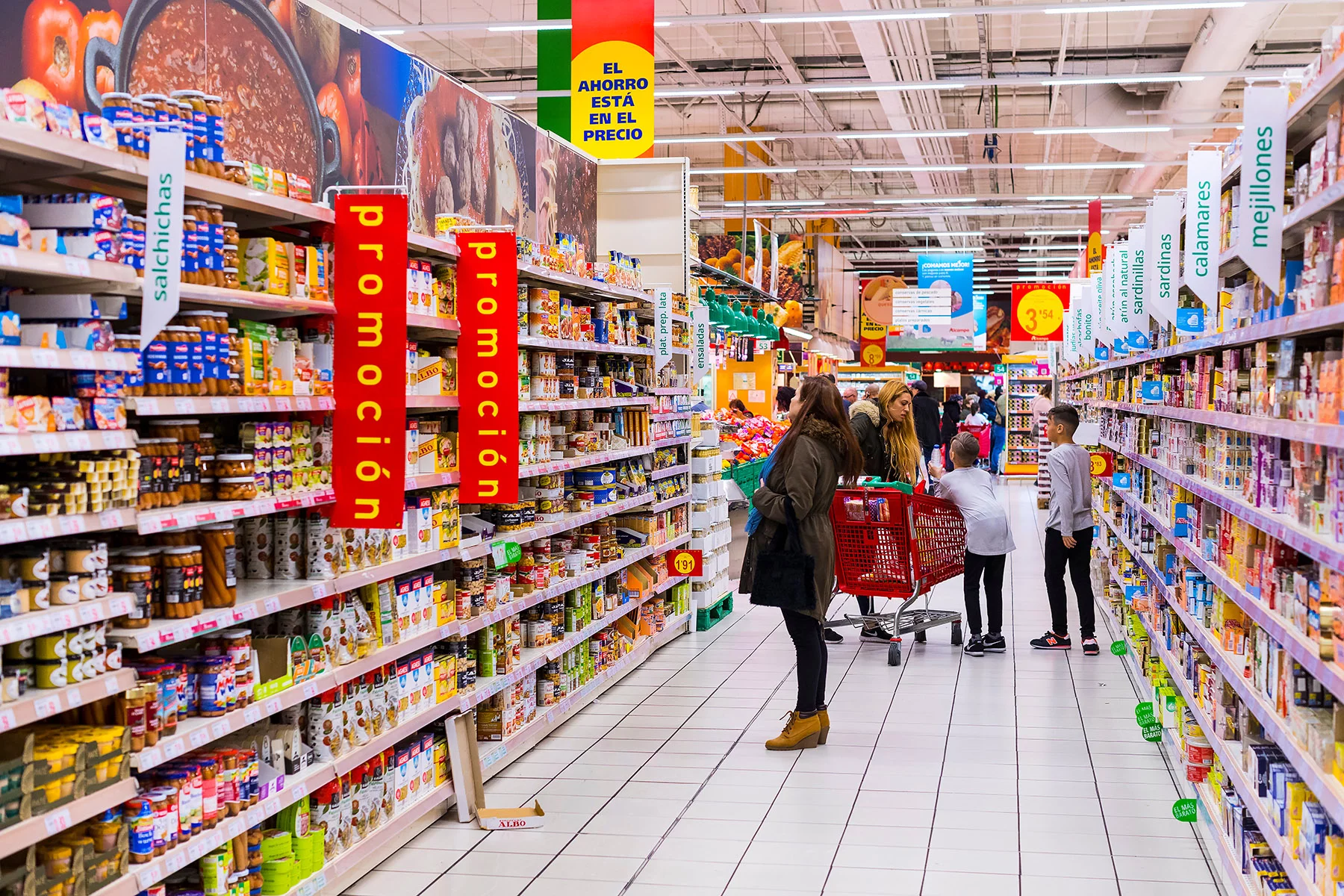
- Switch to own brands: Spanish supermarkets aren’t particularly expensive, but you can still save money on your bill by switching to their own-brand options.
- Don’t expect medicines: Unlike in some other countries, Spanish supermarkets don’t stock painkillers or other such medications. For these products, you will need to visit your nearest pharmacy (farmacia). You can read more about that in our guide to the healthcare system in Spain.
Food delivery services in Spain
If you’re unable to visit your local supermarket, or you simply prefer the convenience of having your groceries delivered, then you’re in luck because Spain has a number of different food delivery options. For starters, most of the major national and regional supermarkets offer home delivery services. This lets you shop online and choose a delivery slot. Some stores may even offer a collection service where you can pick up the groceries yourself from a designated collection point at the store.
There are also a growing number of online-only grocery options in Spain. These online stores can be great options for people with particular dietary requirements, as they typically offer a more dedicated product range. Some online supermarkets that operate in Spain include:
There are other Spanish delivery options, too. These include the increasingly popular food boxes that offer seasonally fresh fruit, vegetables, meat, and more from local producers. There are also meal-kit recipe boxes, which contain fresh ingredients selected for recipes you choose in advance. Another option is to get your groceries delivered by a helper from an online marketplace such as TaskRabbit. And, of course, you can always order a takeaway online if you don’t feel like cooking.
International grocery stores in Spain
Spain is a fairly multicultural country, and this diversity means that it’s easier than ever to find international and ethnic foods when you live there. In larger cities, for instance, you’ll be able to find stores that sell goods from a vast array of international cuisines, including Chinese, Indian, Morrocan, and many more. These stores offer a much better selection of international products at cheaper prices than the main supermarket chains and can be a great place to pick up spices, herbs, and other niche products.
If you’re looking for products from the UK or US, then you may be able to find a small selection in some of the larger supermarkets across Spain. However, this selection will largely depend on where you are, as you’ll find more choice in large cities and resort areas that are popular with expats. These include the Costa Blanca and the Costa del Sol, where you’ll find Overseas Supermarkets, a chain of grocery stores selling British products.
Food shopping at Spanish markets
Want to take your weekly grocery shop to the next level? Then why not explore your local Spanish food market? Markets are hugely popular throughout the country, and a quick search online will reveal your nearest location. These markets are often located in large covered halls (sheltered from the heat) and can be great places to see your neighborhood come to life. You’ll also be able to buy all sorts of things from the stalls, ranging from fresh vegetables to seafood and everything in between.
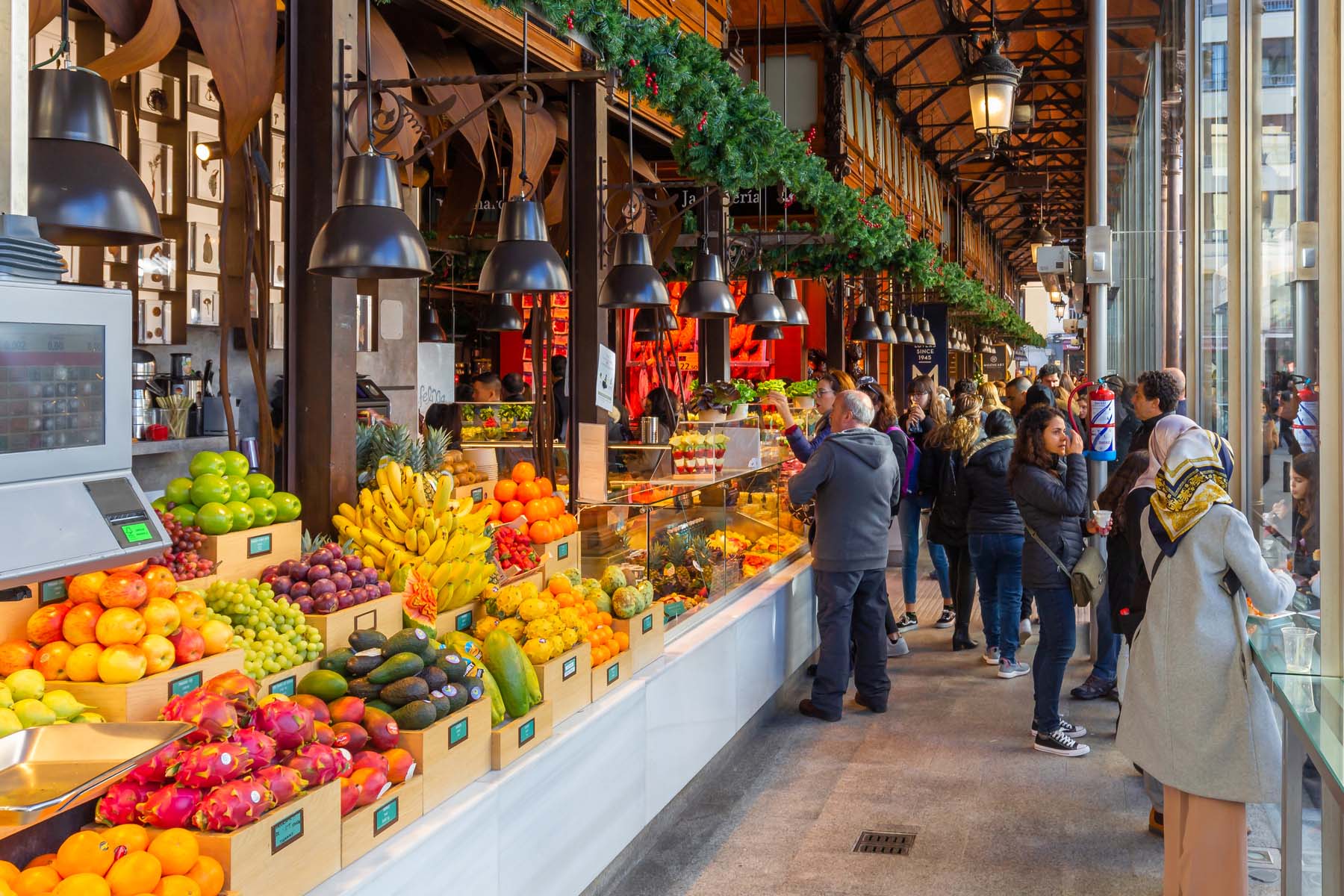
Over recent decades, some of these food markets have become major attractions for foodies from all across Europe. As well as selling fresh food, many stalls offer high-quality tapas, light bites, and meals, too, which helps to attract the crowds. If you’re in the market for some unforgettable food hotspots, be sure to check out Madrid’s Mercado San Anton and Mercado de San Miguel. In Barcelona, swing by La Boqueria, and in Valencia, you’ll want to head to the Mercat Central. For more local options, though, it’s best to check websites and forums where you live and see what you can find.
Specialty stores in Spain
When it comes to buying food in Spain, one of the best things is undoubtedly visiting the country’s many specialty shops. These sell all kinds of delicious goodies, ranging from freshly-baked bread to freshly caught octopus. Luckily, there are plenty of great neighborhood stores where you’ll be able to pick up the very best local produce. To help you out, here are some of the key Spanish terms to look out for when shopping in Spain:
- Bakery: panadería
- Butcher: carnicería
- Fishmonger: pescadería
Health food shopping in Spain
Historically, the Spanish aren’t quite as health-conscious as other Europeans. Instead, they depend on the health benefits of their traditional Mediterranean diets. However, these days, the health food revolution is very much a thing on the Iberian peninsula. As a result, you’ll find a good range of healthier options, from organic produce to vegan ranges, at most major supermarkets. That said, if you’re looking for something a little more niche, then you’ll probably need to check out a local health food store.
As you might expect, you will find a greater selection of health food stores in the larger cities in Spain. Here, you’ll find health products, vitamins, alternative remedies, and much more. They can also be a great place to pick up some natural and organic foods for babies and children. Most of these stores are independently operated, but there are a few chains, such as Holland & Barrett.
Convenience stores in Spain
Need to grab a quick bite? Forgot to pick up one of the all-important ingredients for tonight’s dinner? Well, don’t worry because Spain has you covered with its network of convenience stores and kiosks. On-street kiosks are a great place to buy a newspaper, magazine, light snack, or drink. Convenience stores also sell a wider range of goods and are often open late. You will find that some convenience stores, such as Opencor, are operated by larger brand names.
Liquor stores in Spain
Buying alcohol in Spain is fairly straightforward as it can be bought at all supermarkets that have a liquor license – and that’s pretty much all of them. As long as you’re over 18, you can buy beer, cider, wine, and spirits at supermarkets and grocery stores in Spain. It is also only legal for stores to sell alcohol up to 22:00, so don’t leave your purchases too late if you’re planning a party. You can read more about Spanish drinking culture in our guide.
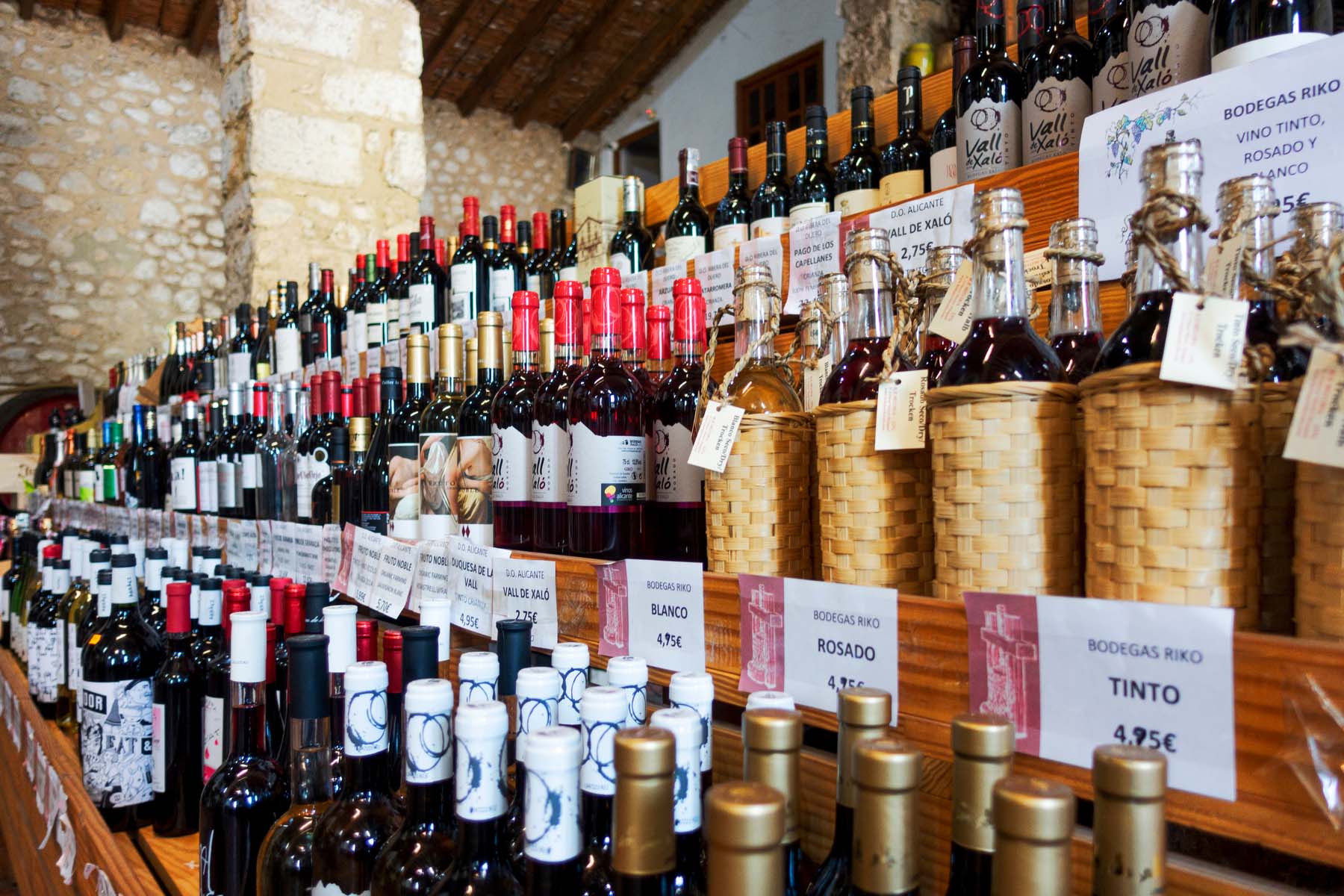
While many people in Spain buy their alcohol from the local supermarket, you’ll typically find a better selection and more knowledgeable staff at a local liquor or wine store which are usually independent. You’ll be able to find your nearest one with a quick search online. Alternatively, there are a growing number of online stores that sell alcohol, including:
Buying groceries from your home country in Spain
Missing your favorite foods from home? Fear not because Spain has a whole host of international grocery options to ensure that you don’t go without. Most of the larger supermarkets will stock a small range of international goods from around Europe and beyond. However, this selection will largely depend on where you are in the country, as supermarkets will typically cater to large local expat communities.
In larger cities and resort areas, you’ll also find dedicated international grocery stores that cater to the tastes of expats from around the world. You can search our directory to find your nearest stores. However, if these aren’t convenient, there are also a growing number of online grocery stores that can deliver your favorite foods straight to your door. This includes British Corner Shop, which specializes in UK goods.
